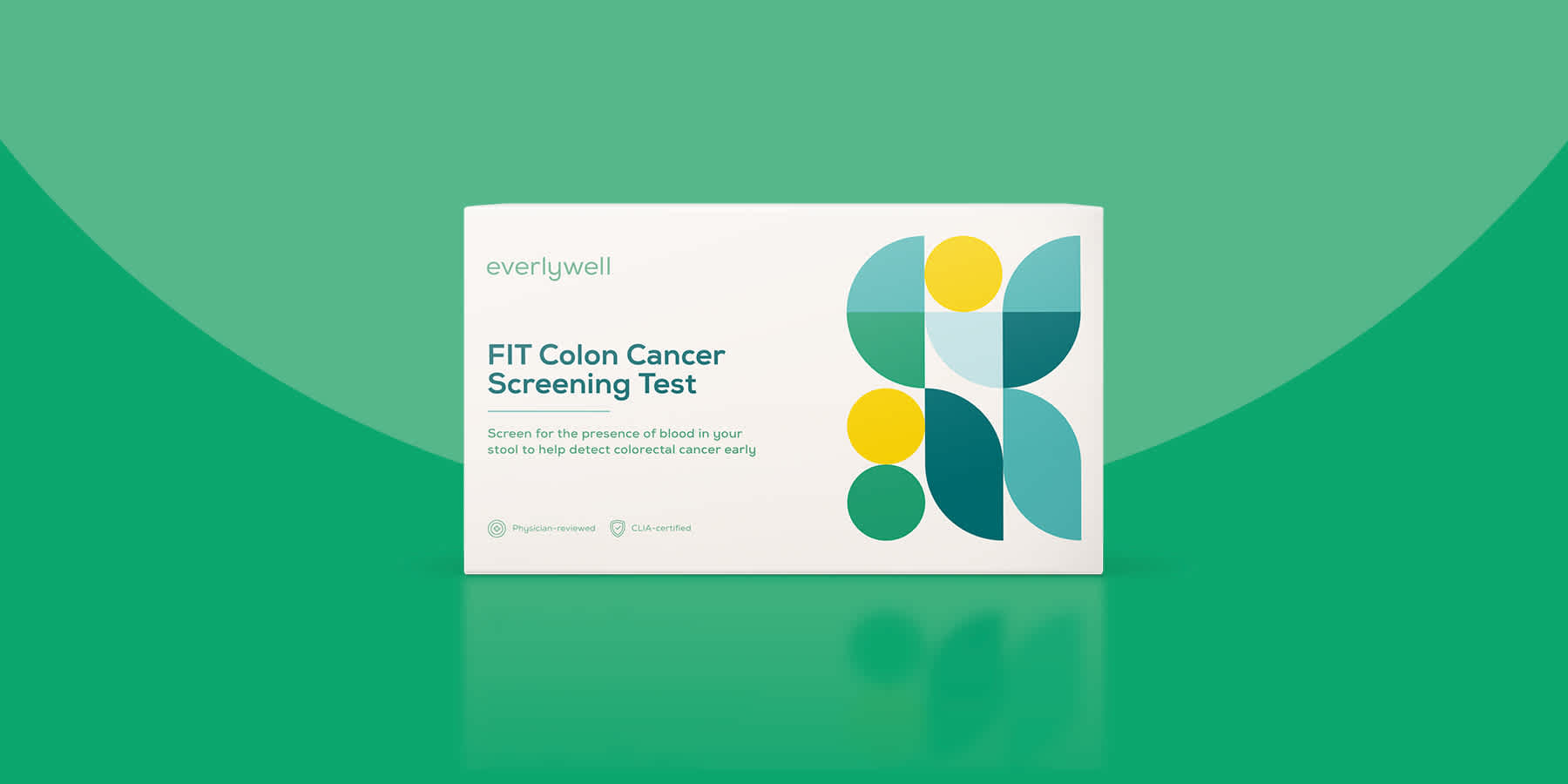
Updated February 23, 2024. Medically reviewed by Neka Miller, PhD. To give you technically accurate, evidence-based information, content published on the Everlywell blog is reviewed by credentialed professionals with expertise in medical and bioscience fields.
Table of contents
Colon cancer is one of the most common cancers in the United States, ranking third in terms of most common (if breast and prostate cancer are combined). [1] The five-year relative survival rate ranges from 74% for stage I colon cancer to just 5% for stage IV [1]; treatments are available to control colon cancer and manage symptoms.
It’s important to catch colon cancer early before it has had time to grow or spread to other tissues. This is where regular screening plays an important role. Screening tests come in a variety of forms, including fecal immunochemical tests, or FIT. [2] Everlywell offers an at-home colon cancer screening test that you can do from the convenience of home (you collect your sample at home and ship it to a lab for analysis). Learn more about FIT below.
What Is FIT?
FIT stands for "fecal immunochemical test," so the proper terminology is just “FIT” instead of “FIT test” (since “test” is already a part of the FIT acronym). This type of screening test is designed to detect hidden blood in a stool sample. [3] Blood vessels in larger colorectal polyps or cancerous growths are much more fragile and can be easily broken by the passage of a stool, causing bleeding in the colon or rectum. However, this bleeding is usually too minor to see in your stools with the naked eye.
Thankfully, this type of colon cancer screening can find trace amounts of blood in your stools. This stool-based test is an accurate means of detecting possible signs of polyps or colorectal cancer. [3] These tests are convenient in that they can be performed at home and are less invasive than a colonoscopy. However, stool-based tests have to be done more often — in the case of FIT, every year — and a positive test result may require another screening test. [4]
Unlike other stool-based tests, FIT does not have any drug or dietary restrictions as foods and vitamins have no effect on the processing. FIT is also less likely to react to bleeding from the upper parts of your digestive system, like your stomach or small intestine.
Collecting a Sample
FIT requires you to collect your own fecal sample. Some people may be squeamish about this, but it is a fairly easy process. It’s all painless, presents no risks to your health, and you won’t feel anything.
Supplies will vary depending on the cancer screening kit, but it usually includes:
- Test tubes or test cards
- A collecting device, like a large brush
- Waste bags
- The mailing envelope
Make sure you keep all of these items ready to use in one place. Different colon cancer screening kits can have different instructions, so follow the instructions of your specific kit. If you run into any problems or have questions about the test kit, consult your clinic or healthcare provider’s office.
What Your Results Mean
Once you send your stool samples to be processed, it may take a few days to receive your results. Normal results mean that the test did not detect any blood in your stools. This can be a relief, but as colon cancers may not always bleed, you may have to repeat the test a few times to confirm your results.
If the FIT does detect blood in your stool, your healthcare provider will perform other tests, which may include a colonoscopy. Remember that the FIT does not diagnose cancer on its own, but it can detect early signs of cancer. Colonoscopies, sigmoidoscopies, and other screening tests used in conjunction with FIT can help to find colon cancer early. [2]
If you believe you have colon cancer or are at a high risk of colon cancer, a FIT test is a great way to screen for it and provide yourself some peace of mind. Everlywell offers a FIT kit for at-home sample collection that is easy to use and understand. If your results come back abnormal, you can consult your healthcare provider to determine the next steps.
To find out more about the causes of colon cancer and to learn more on how to prevent colon cancer, check out our blog for more information.
Related Content
Colon Cancer and Prevention 101: What to Know About Colon Cancer
We Asked a Registered Nurse What You Should Know About Colon Cancer Screenings—Here’s What She Said
How to Talk About Cancer Screening With a Loved One
References
- Lotfollahzadeh S, Recio-Boiles A, Cagir B. Colon Cancer. In: StatPearls. Treasure Island (FL): StatPearls Publishing; June 3, 2023.
- Kumar R, Lewis CR. Colon Cancer Screening. In: StatPearls. Treasure Island (FL): StatPearls Publishing; September 26, 2022.
- Kaur K, Zubair M, Adamski JJ. Fecal Occult Blood Test. In: StatPearls. Treasure Island (FL): StatPearls Publishing; April 23, 2023.
- Fecal occult blood test. Mayo Clinic. Medical Citation URL. Accessed February 23, 2024. Published May 4, 2022.
Neka Miller, PhD holds a PhD in Molecular Pharmacology and is an experienced technical writer covering topics including pharmacology, cancer initiation, neuroscience, and traumatic brain injury. Miller has also created manuals and custom reports featuring data visualizations, protocols, method sections, and manuscripts, as well as authoring published works in scientific journals. Miller has been performing research, writing, and publishing works for over 15 years, and currently serves as the Director of Institutional Effectiveness as well as an Adjunct Professor in the Doctor of Healthcare & Education Leadership (Ed.D.) program at Clarkson College.
Spotlight on
Featured content

86% of cancers aren't caught by recommended screenings. See what they're missing with a single blood draw.
Save $100 now
Explore Everlywell









